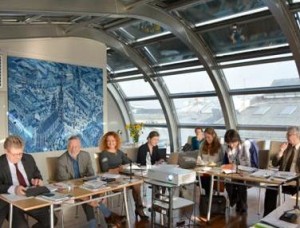The fourth Steering Committee meeting of the CHCFE project took place on 16 October in Krakow. Hosted by CHCFE partner, the International Cultural Centre, 12 representatives of the six project partners were in attendance. The purpose of this meeting was to have progress reports from the two teams responsible for mapping and analysing the multiple benefits of Europe’s cultural heritage and to discuss the project’s draft report and recommendations.
 Since the beginning of the year, teams from the International Cultural Centre (ICC) in Poland and the Raymond Lemaire International Center for Conservation (RLICC) in Belgium have been collecting existing evidence on the impact of cultural heritage in Europe through extensive desk research, contributions from the heritage sector via an online survey, and by working with national experts in 11 countries. Now in the phase of analysing this evidence, ICC and RLICC are elaborating a cultural heritage impact matrix to present in detail the potential of cultural heritage and its intersecting influences across all aspects of society with a specific focus on Europe’s economy, society, culture and environment.
Since the beginning of the year, teams from the International Cultural Centre (ICC) in Poland and the Raymond Lemaire International Center for Conservation (RLICC) in Belgium have been collecting existing evidence on the impact of cultural heritage in Europe through extensive desk research, contributions from the heritage sector via an online survey, and by working with national experts in 11 countries. Now in the phase of analysing this evidence, ICC and RLICC are elaborating a cultural heritage impact matrix to present in detail the potential of cultural heritage and its intersecting influences across all aspects of society with a specific focus on Europe’s economy, society, culture and environment.
ICC organised two additional events open to the public entitled “What is Heritage Worth?”: first an international debate on the evening of 16 October and an open lecture on the evening of 17 October. The aim was to nourish the Steering Committee discussions, present the project to a wider Polish and Central European audience, and broaden knowledge on the topic of cultural heritage’s impact in Europe.
The international expert debate with Péter Inkei, Monika Murzyn-Kupisz, Christian Potiron and Kate Pugh, chaired by Joanna Sanetra-Szeliga gathered over 40 people (academics, students, practitioners) interested in the four pillars of impact of cultural heritage on various spheres of life that were identified as a part of the project (economy, society, environment, and culture). During the debate experts presented the pillars and discuss various approaches to measuring the value of heritage.
The following day a renowned expert of heritage management and urban tourism, Professor Gregory J. Ashworth, gave a lecture to over 80 participants on heritage as a means of using the past for the contemporary purposes. Heritage directly and indirectly influences socio-economic development. Although widely attempted, there is no universal model for success of heritage-led development projects. It might happen that such a project fails as aside the benefits there are costs to be born as well. The lessons are to be learned from practice, but they are the lessons of careful management and not the lessons of automatic imitation of successful projects already implemented somewhere else.
These two events helped project partners to collect additional information, opinions and recommendations regarding evaluation practices that can be useful for the project’s final report which will be presented to the public on 12 June in Oslo on the occasion of the Europa Nostra Annual Congress 2015.
The CHCFE Steering Committee will meet again on 2 February 2015 in Leuven, Belgium just prior to the start of the Thematic Week “Heritage Counts” (3-6 February) organised by the Raymond Lemaire International Centre for Conservation (RLICC) at KU Leuven. This event, which grew out of the valorisation actions implemented within the Cultural Heritage Counts for Europe project, will bring together European policymakers and international researchers involved in cultural heritage. The Thematic Week will deal with the economic, social, environmental and cultural impact of cultural heritage and aims to provide an international overview of discourse, strategies and case studies. Click here for more info on the Thematic Week.
